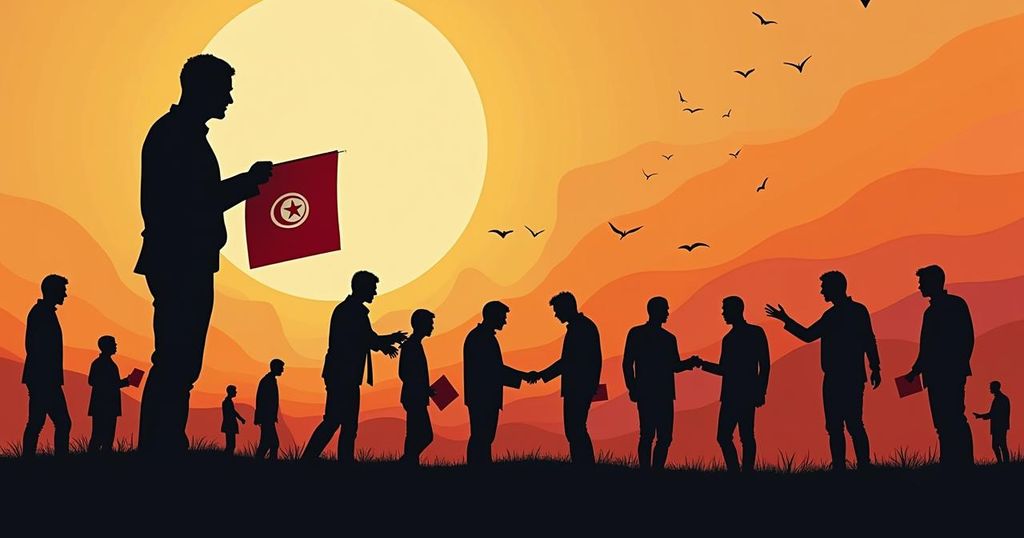Political Crackdowns and Low Voter Turnout in Tunisia’s Election

Tunisia’s presidential election presents a landscape fraught with political repression and low voter turnout, as incumbent President Kais Saied faces minimal opposition amid significant imprisonment of rivals. Economic struggles persist, and opposition sentiment leads many to boycott the election, reflecting profound disillusionment within the electorate. Saied’s political maneuvers since 2021 have drawn criticism from pro-democracy factions, casting doubt on the legitimacy of the electoral process and the future of Tunisia’s democracy.
On Sunday, Tunisia held a presidential election amidst a backdrop of political repression, as incumbent President Kais Saied faces minimal opposition due to the imprisonment or disqualification of major rivals. Five years after his initial victory, which capitalized on anti-establishment sentiments, Saied now contends with an election marked by widespread skepticism among voters about the prospects of meaningful political change. This election represents the third in Tunisia following the 2011 ousting of long-time autocrat Zine El Abidine Ben Ali, an event that initiated the Arab Spring movement across the region. At its peak, Tunisia was viewed as a beacon of hope for democratic governance in the Arab world, highlighted by its new democratic constitution and the recognition of its civil society’s role in political stability with a Nobel Peace Prize. However, the subsequent years have seen Tunisia struggle with economic decline and political strife. Saied, who was elected in 2019, came to power promising a revitalization through a “New Tunisia” that empowered youth and local governance. Yet, his presidency has been characterized by significant power consolidation following a series of controversial actions in July 2021, including suspending parliament, sacking the prime minister, and rewriting the constitution. This trajectory has drawn sharp rebuke from pro-democracy factions and opposition parties, branding Saied’s movements as a coup. Despite this, a low-turnout referendum sanctioned his constitutional amendments last year, reflecting a climate of political apathy amidst economic hardship. This election also serves as a litmus test for public sentiment regarding the direction of Tunisia’s democracy, especially after significant political suppression. Of those who sought to challenge Saied, only two candidates emerged: Zouhair Maghzaoui, a politician critical of Saied’s economic strategies yet associated with the controversial constitutional changes, and Ayachi Zammel, a businessman recently convicted in connection with voter fraud. Notably absent from the ballot are prominent opposition figures such as Rached Ghannouchi, leader of the Ennahda party, and Abir Moussi of the Free Destourian Party, both of whom have been imprisoned for their political views. Amidst these events, the Tunisian economy is grappling with rampant unemployment, particularly among youth, while the government treads cautiously in negotiations with the International Monetary Fund for a bailout package. Saied has resisted many of the reform conditions sought by the IMF, further complicating Tunisia’s financial landscape as it faces over €8 billion in debt to multilateral lenders. The combination of economic despair and a crackdown on dissent has fueled migration efforts among the youth, with many seeking to escape the country, a situation exacerbated by Saied’s hostile rhetoric against sub-Saharan migrants, culminating in violence and stringent crackdowns on migrant communities. Internationally, Tunisia maintains traditional ties with Western allies while expanding relationships with countries like Iran and China, highlighting a balancing act in foreign policy. Despite Saied’s populist rhetoric against external influence, Tunisia’s position in managing European migration continues to be recognized as a model, revealing a complex interplay between domestic challenges and international expectations.
The political landscape in Tunisia has been marred by significant repression and turmoil since the ousting of Zine El Abidine Ben Ali in 2011. Initially celebrated as a success story of the Arab Spring, the country has since experienced economic degradation and political disillusionment. Kais Saied, elected in 2019, promised reforms but has instead consolidated power, leading to the imprisonment of key opposition figures and a climate of fear among dissenters. This ongoing political suppression has not only affected the election process but has also influenced rising migration trends as economic conditions deteriorate, prompting many young Tunisians to seek opportunities abroad. The present election, marked by low turnout and minimal opposition, is indicative of widespread distrust in the political system and the challenges facing Tunisian democracy.
In summary, the presidential election in Tunisia reflects a troubling state of democracy, characterized by the absence of viable opposition and a populace largely disillusioned by the political process. Kais Saied’s consolidation of power, coupled with economic challenges and repression of dissent, has created an environment rife with skepticism about the future of governance in Tunisia. The election’s outcome is unlikely to catalyze significant change, as deep-rooted issues continue to plague the nation, further complicating its path towards stability and prosperity.
Original Source: www.euronews.com







